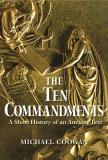Ever Ancient, Ever New
In the past 12 months, at least nine new books in English on the Ten Commandments have been published by Christian and Jewish writers, both biblical scholars and ethicists. One may wonder what makes the renowned biblical scholar and Harvard Old Testament/Hebrew Bible lecturer Michael D. Coogan’s The Ten Commandments different from others.
First and foremost is his contention that there are three biblical versions of the Ten Commandments. Coogan’s claim departs from the common view that there are two basic versions, one in Exodus 20, the other in Deuteronomy 5. This third version, which he finds in Exodus 34, is known as the Ritual Decalogue.
Another distinctive feature of Coogan’s work is its aim to present a short history of this ancient text. Coogan differs from other writers who focus on the text’s original meaning or its present implications. While he agrees with growing scholarly consensus that “[b]efore we can decide on the relevance for our time of a text that is several thousand years old, we should determine what it meant in its original setting, to its first audiences,” Coogan believes that considering the historical (and literary) context as well as the ancient history of the text is the proper starting point.
In three chapters, Coogan gives the histories of the three versions of the Ten Commandments, tracing the background and treating questions that would occur to many readers, like the originality and plurality of the documents. Only then does he offer a brief exegesis of each commandment found in Exodus 20. Coogan moves on to describe how the Ten Commandments were received within the early Christian Church—the Decalogue alone was considered to be universal and hence binding on all Christians. The Jewish community countered this Christian claim, Coogan notes, by declaring all the commandments in the Torah equally binding.
Although the author does not offer a hermeneutics for the entire text, his discussion of the abridgements of the text since biblical times points to two major issues: the origin of the text and our right to edit or interpret the text. He argues that the Ten Commandments “could not have been divinely given” and that the contents are historically conditioned. His conclusion: “With its various versions and interpretations of the Decalogue, the Bible both forces us and even authorizes us to continue to do the same—to reformulate, to interpret, and even to ignore and to reject.” In this way, a fluid rather than literal observance is needed, a point he draws in discussing selected subjects: making images of God, Sabbath observance, slavery and women’s subordination to men.
These issues aside, the remote context of Coogan’s work is the ongoing debate over displaying the Ten Commandments in public places, like the Supreme Court, a controversy to which he returns at the end of his book. He points out that the Ten Commandments are the “primary text of Yahweh’s contract, his covenant, with the Israelites” resembling an ancient treaty. For some, it is part of the “history of law” and part of the history of the Untied States. So Coogan floats the idea of a modified historical display of the code, without explicit reference to divine origin or formal religious contents.
Coogan’s deeper concern, however, is that the North American controversy is really not about the Ten Commandments itself but about imposing certain human values claimed by religious groups. That, he argues, would contradict the “underlying values of the Bible” and of the Ten Commandments themselves, especially the value of equal respect of others, which are still valid and authoritative today.
His treatment of each commandment is both accurate and informative, and in line with the current scholarship (e.g., the actual meaning of Exodus 20:13 points to intentional killing). He also skillfully, through the lens of history, shows what they originally meant for Israelites and how they are related to other Hebrew and contemporary texts.
But treating this important ancient text in a concise book format is always a challenge for even excellent scholars. I find this to be problematic when Coogan explores the original meanings of the commandments. Why, for example, does he choose the version in Exodus 20 as the base text if he argues that the Ritual Decalogue is the oldest among the three? Or why does he spend so much time on the first four commandments, which concern respect toward God?
By contrast, some of the remaining commandments are treated too briefly to be satisfactory, especially the prohibitions on adultery and stealing. At times he misses some necessary explanations. For example, in discussing the commandment against murder, Coogan refers without any explanation to those texts that talk about God’s demand for total extermination of the entire enemy. We might also expect more substantial arguments to support his decision to use “kidnap” as an alternative translation for “steal” in Ex 20:15.
Finally, from a Catholic ethicist’s viewpoint, Coogan’s reflection on the contemporary meaning of the commandments may raise some concerns: on what grounds, for example, does he select his subjects for discussion? Moreover, when criticizing the Catechism of the Catholic Church’s view on sexual offenses, he seems to think that its source is singularly biblical and not also from the natural law tradition.
Still, much as Daniel Harrington, S.J., the late biblical scholar and long-time contributor to America, did in some of his later works, Coogan does us a great favor by introducing one of the world’s most famous and yet least understood ancient texts in a very concise, accessible manner. Coogan’s book would also serve as a fine complement to those recent ones more interested in the historical reception of the commandments or even a contemporary understanding of them and their relevance for us today, like Dominik Markl’s The Decalogue and Its Cultural Influence and Rabbi Rifat Sonsino’s And God Spoke: Ten Commandments and Contemporary Ethics.
This article also appeared in print, under the headline “Ever Ancient, Ever New,” in the February 2, 2015, issue.








